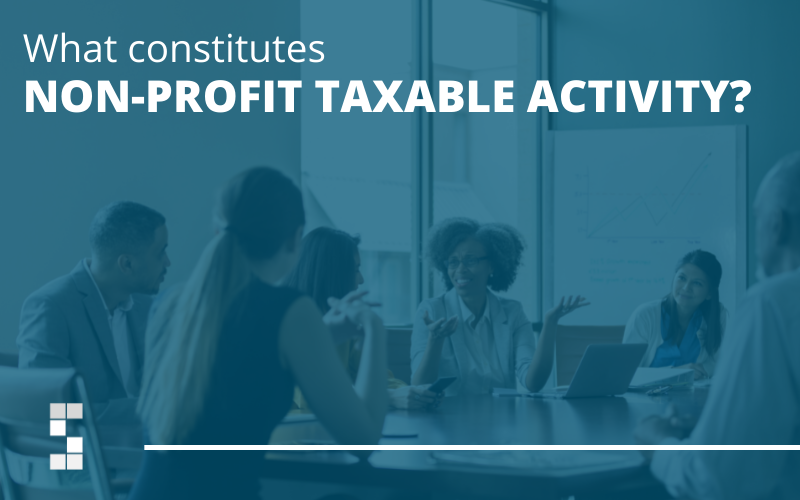It’s generally assumed that nonprofit businesses with a 501(c)(3) status, (particularly churches,) don’t have to pay taxes on – well, anything. While that is mostly true, there are definitely exceptions to the rule. Not fully understanding those exceptions could cost your nonprofit organization money and, in extreme cases, your organization’s 501(c)(3) status.
If you do the bookkeeping for or manage a nonprofit, it’s important to remember that your charitable status does not give you a license to never be taxed on any of the money you bring in. As a nonprofit entity, it is crucial for you to understand the nuances of taxable vs. nontaxable income.
Let’s talk about what it looks like to maintain a charitable status and what situations your nonprofit might face where funds received need to be classified and reported as profit.
Maintaining Charitable Status
First, to be deemed a nonprofit an organization must file for and receive 501(c)(3) status from the IRS. A non-profit also needs to obtain a state business license. Rules can vary from state to state, but generally, your state business license will need a renewal occasionally. The 501(c)(3) status does not need to be renewed but can be revoked by the IRS if they determine it is being exploited for profit.
Every nonprofit organization must file a Form 990 each year. While this form isn’t reporting taxable income, it does report your organization’s income and expenditures to the IRS each year. This transparency with the IRS is as much for your organization’s protection as it is for the IRS’s. As we’ll see ahead, there are many “gray” areas nonprofits can find themselves in where the line between donations and for-profit transactions can get blurry. The 990 form helps a non-profit prove that it is following the rules and not abusing its charitable status.
What qualifies as non-profit taxable income?
The most basic way to determine whether or not your nonprofit’s income is taxable or not is to consider if it’s actually a freewill donation or if it is a transaction of goods for money. Anything not purely a donation needs to be taxed as profit.
Let’s look at some situations an organization might find itself in where these questions might arise:
It is not uncommon for large churches to have a coffee shop, bookstore, or thrift shop under their organization’s umbrella. Even if the profits from these stores go directly to fund the church’s charitable work, they still need to be taxed the same as any independent coffee shop or bookstore would be.
In a coffee shop, gift shop, or thrift store, customers exchange money for a product sold for a specific price. Ultimately, this is a for-profit business functioning within a non-profit.
The same policy applies to the exchange of services for money. Let’s say a church runs a daycare center out of its facility. If parents and guardians are paying the church for the service of caring for their children, this is an exchange of services for profit. Even if a church is renting space out to another non-profit organization or renting out its resources, (like a parking lot), that rent income still needs to be reported as profit.
Reporting Taxable Income as a Nonprofit
If your nonprofit organization engages in transactions like the ones mentioned above and is receiving any income that doesn’t qualify as purely donation, it will need to take extra steps to ensure that income is accounted for properly.
The 990T (990 Taxable) form is specifically for nonprofits to report any income that needs to be taxed as profit. This is a separate form than the 990, which every nonprofit needs to file, and does not account for taxable income.
Situations that Fall Under “Donations” and Do Not Need to be Taxed
What about more nuanced situations like fundraisers, you might ask? What organization doesn’t occasionally host a raffle, a “spaghetti dinner,” or a bake sale to raise money for a charitable cause or mission?
As long as the money raised goes directly to the advertised cause, an organization can have a “suggested donation amount” or “pay what you can” policy that keeps it under the “donation” bracket, thus avoiding taxes. In this instance, there isn’t a consistent revenue stream being built under a non-profit umbrella; it is a one-off event.
Similarly nuanced are situations where an organization is refunded for products/services. Perhaps a youth group wants to have t-shirts with their group’s logo, or a small group wants to host a catered dinner event. An organization can ask participants to pitch in a set amount of money to cover those costs, and because it is a one-time, low-volume transaction with direct ties to a net-zero profit, it does not need to go under the “profit” bracket.
Consequences of not following the rules:
Conceivably, if your organization has 501(c)(3) status and the IRS determines that you are not properly following their rules, they retain the right to revoke your charitable status.
Unfortunately it is totally feasible and possible for an organization to start a fraudulent non-profit simply to get around income and property taxes. The IRS is fully aware of that, which is why the 990 and 990T forms are necessary to keep transparency and accountability between a non-profit and the government.
In the same vein, it is also possible for a nonprofit with good intentions to appear to the IRS as if it has been acting fraudulently, simply by not understanding and distinguishing correctly between what income falls under “donations” and what income falls under “profit.”
If you are a bookkeeper for a nonprofit, it’s important to tread wisely as you make these distinctions. Your charitable status and your organization’s reputation hang on it!
At System Six, we want you to know that you don’t have to do this work alone. We have years of experience helping churches and nonprofits manage their bookkeeping, and we also can make referrals to vetted, experienced nonprofit-specialty CPAs as resources for 501(c)(3) companies.
Want to learn more? Contact us today!

